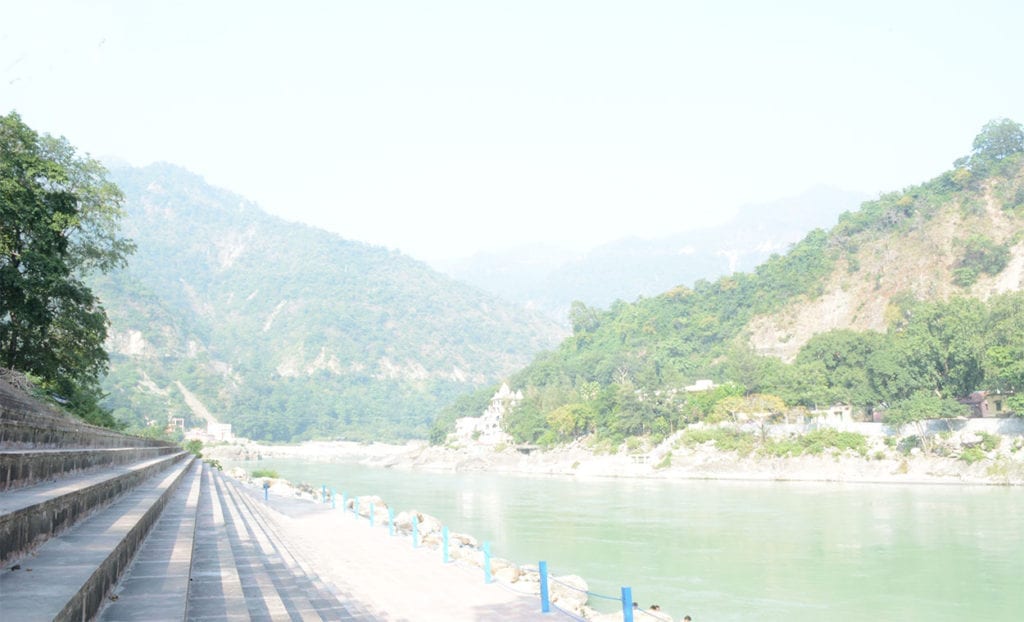If you turn off the main road leading to Shivpuri and walk through the many narrow alleys, you’ll find an area teeming with adventure sports companies, enticing tourists in ways that gradually erode the local culture in Rishikesh.
For those who can see its invisible forces and sense the unseen currents in its air, Rishikesh is a magical world. It is one of those places where you would want to come to regain your inner consciousness and learn about maintaining harmony with the world – by staying close to the Ganges and under the undiluted purity of the Himalayas.
Yet for many, it has become a place for enchantment, for having a few pints of beer and enjoying the current of the Ganges, rafting, and kayaking. But that’s not what Rishikesh’s real charm is, at least not in its real sense.
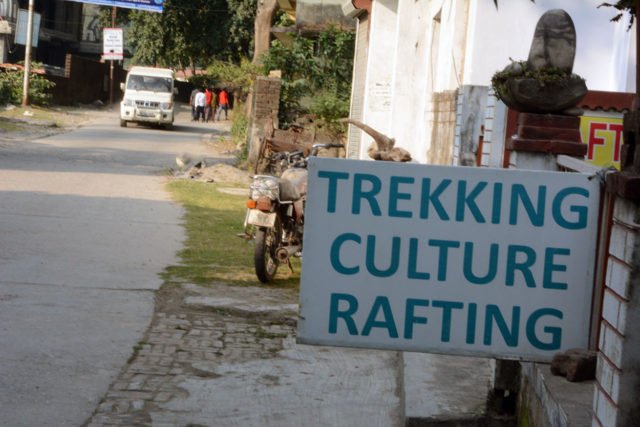
Is Rishikesh Still Worth Visiting?
Rishikesh has long been known as the Yoga Capital of the World, a spiritual town resting on the banks of the Ganges and surrounded by the Himalayan foothills. Over the years, it has transformed from a quiet pilgrimage destination into one of India’s most visited travel hubs — attracting backpackers, spiritual seekers, adventure lovers, and weekend tourists alike.
But with rising crowds, commercialization, and changing travel trends, many travelers now wonder: Is Rishikesh still worth visiting?
The answer depends on why you are going. For a person like me, it is not! Yes, Rishikesh is not worth visiting anymore!!
I’ve some personal attachment to this place, some affection, this is where I once spent two months taking spiritual lessons and learning my inner peace. Read: My Sivananda Ashram Rishikesh Experience
Time and again, Rishikesh calls me and makes me want to come back to its cosy, almost mythical streets, yearning for self-discovery, for answers about life and all those things I am not fairly connected with. And no, I’m not alone. This has always remained the land of rishi-munis, of sadhus, of those learned men who’ve travelled across India, in search of a place, almost untainted, to practice meditation and seek the higher truth, but only ended up retiring here.
From Swami Vivekananda to Swami Shivananda and their uncountable followers – Rishikesh has acted as the fatherland for people to walk on their spiritual journey. No wonder, this town is a place to practice spirituality and not adventurism.
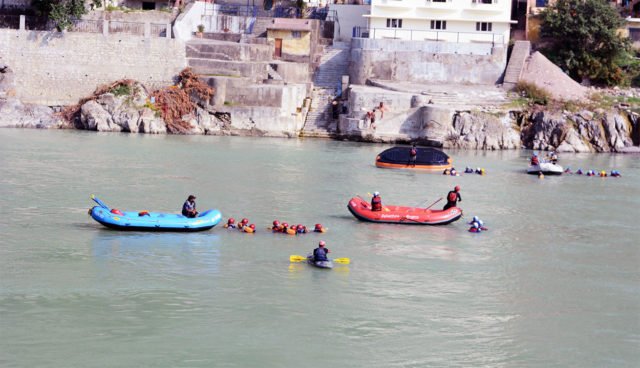
Rishikesh is no less than a holy place for me, and for those who discern a different sense of warmth from it. It has some sort of force full of magic, and if it is, it speaks for the magic that is only pushing back and forth the clear daylight world of reason. Those born with a higher sense of knowledge seldom have to go back to the world for it. Yet here, all these ideas are upended.
Here, in Rishikesh, people come back inquiring about those questions, stretching their sense of understanding, again and again. After all, this is where the holy Ganges bids farewell to the colossal Himalayas.
But now, Rishikesh is quickly transforming from being a spiritual destination to a place that preaches materialism and money hoarding. From drinking beer to trying river rafting, new experiences are taking over the old charms.
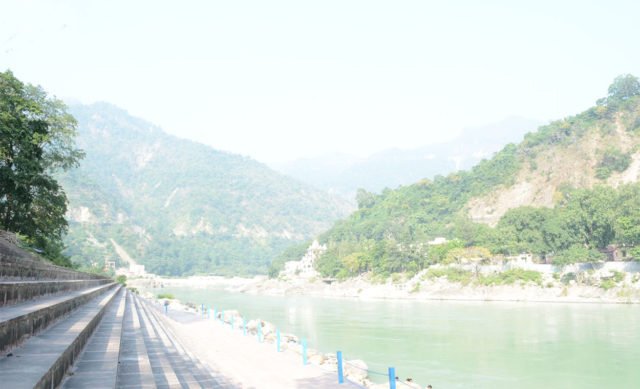
When I was in Shivananda last year, in 2015, trying to “be good and do good” as Swami Shivananda always taught people, I realised that the new and fancy businesses, stretching their boundaries around its little walkways are deteriorating the very essence of this place.
And with each visit, I get a sense as if this place is moving faster than ever to become one of those quintessential Himalayan towns, with a strip of shopping centres and tourist shops.
Some places are better left untouched if only we don’t want to see ourselves regretting, years later, for not doing anything to save their cultural significance, and let them transform into just another tourist town around us – or let’s say, into yet another Lhasa – lost in the translations of the world.
And that’s what happening to Rishikesh, slowly, but evidently!
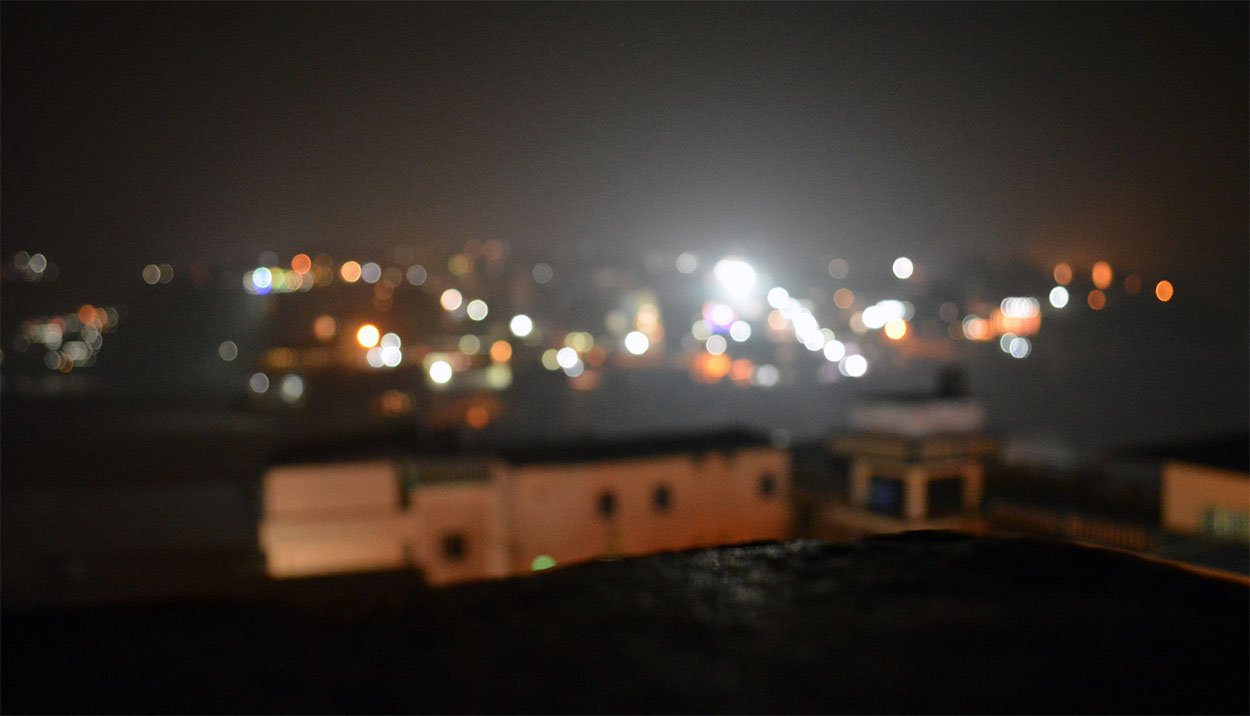
Most people don’t find Rishikesh to have such high religious significance, as they otherwise do while speaking of Kedarnath or Badrinath. But for me, it is. And sadly, it also is one of those (unfortunate) consecrated lands around the world that are going through a never-ending cultural makeshift.
Rishikesh is calling us every minute, to take our first step towards preserving its true identity, before it’s too late.
From Hrishikesh to Rishikesh
Fondly known as Hrishikesh (which today has become Rishikesh) is a partnership land between the four districts of Uttarakhand – Pauri, Tehri, Haridwar and Dehradun. By the combination of these four districts, Hrishikesh is made. It is also known by the name of “Tapo Bhoomi”.
- This spiritual place has been the Tapo Bhoomi of Swami Sivananda, the one with whom yoga is spread not just in India but across the world.
- It was in Hrishikesh where Swami Satyananda Ji has also done yoga. And opened the first yoga university in India, popular by the name of “BIHAR SCHOOL OF YOGA”.
- It is in Hrishikesh where the Ganga flows straight out of the land, doing good for the whole region and destroying the sins (as believed by the Hindus).
- Hrishikesh is the place which has also been the karmabhoomi of maharishi Mahesh Yogi.
- It is Hrishikesh that is considered to be the abode of Mahadeva and is under the chain of Kedarnath.
- It is here that the aarti of the Ganga during the evening and the chanting of the Vedas make the area go into meditation.
- This is where a man comes and feels peace and ends up with his old misdeeds after he has bathed in the Ganges.
- This is the place where the oldest Sanskrit colleges are located and where Sanskrit learning and yoga are studied according to tradition even today.
- Hrishikesh is the place of origin of mahakumbha.
- Rishikesh has, for ages, been chosen by Yogis to live and to do their sadhana
- Hrishikesh is the name of Lord Krishna which is called Yogeshwar and is considered “the door of the Himalayas”.
Another Similar Story: Varkala — The dying ‘Benares’ of the south
Why I Don’t Like Rishikesh Anymore
The Crowds Have Changed Everything. Earlier, it used to be a peaceful yoga town. Now, it feels like a weekend carnival.
During peak season, especially long weekends, you’ll see:
- Traffic jams near Tapovan and Laxman Jhula
- Cafés packed with Instagram crowds
- Loud music replacing silence
- Queue outside temples and the evening Ganga Aarti at Parmarth Niketan Ashram and Triveni Ghat
If you’re searching for “peace in Rishikesh”, you’ll have to work hard to find it now.
Earlier, yoga schools and ashrams dominated the vibe. Today it is:
- Adventure camps outnumber meditation centres
- Cafés compete on aesthetics rather than authenticity
- Spiritual retreats are often overpriced “packages”
- It’s not that spirituality is gone — it’s just buried under tourism marketing.
Rising Prices, Falling Value in Rishikesh is unrealistic. And budget backpackers will notice this immediately.
Hostels, river-view cafés, and activities are now priced closer to Goa than a Himalayan town.
You can still travel cheap, but you need planning. Walk-in travelers often overpay.
Rishikesh has become a content factory.
Every sunset point now has tripods. Every café has “photo spots.”
For some, this is fun. For others (like me), it kills the charm.
But Here’s the Truth — You May Still Love Rishikesh
Despite everything I’ve said, Rishikesh still has the Ganga flowing beautifully and an impressive Yoga culture (though commercialise now with Indian Yoga teachers chasing western girls).
Other than that, the town still has a good backpacking community and the beauty of Himalayas.
If it’s your first visit, you will likely enjoy it.
My disappointment comes from comparison — from seeing what it was versus what it is.
So instead of asking “Is Rishikesh worth visiting?”
Ask: “Is Rishikesh worth visiting for me?”
And if you plan to visit, check out this detailed travel guide, including tips on best time to visit Rishikesh, things to do and top tourist highlights in Rishikesh.
Check out this Youtube video of my Delhi to Rishikesh journey. More related videos can be found on my YouTube channel…
FAQs About Rishikesh (Answers From a Frequent Visitor)
Over the years, I’ve received hundreds of emails and Instagram DMs about Rishikesh travel planning. Many questions repeat, and most people are trying to understand whether it fits their expectations.
So here are more Rishikesh FAQs, written from personal experience — not brochure optimism.
Is Rishikesh worth visiting in 2026?
If it’s your first time, yes — it is still worth visiting.
If you’re returning after many years expecting the same quiet yoga town, you may feel disappointed like I did.
Rishikesh today is more commercial, more crowded, and more social-media driven. But it still offers:
- Yoga and meditation opportunities
- Scenic Ganga views
- Adventure activities
- Café culture
- Weekend escape vibes
Think of Rishikesh as a mixed experience rather than a pure spiritual retreat.
How many days are ideal for a Rishikesh trip?
For most travelers:
2 Days in Rishikesh: Enough for rafting, café hopping, and evening aarti.
3 Days in Rishikesh: Ideal for relaxed sightseeing and a short hike.
5–7 Days in Rishikesh: Best if you’re joining a yoga course, meditation retreat, or workation.
If you’re visiting despite knowing the town isn’t as peaceful as before, I’d suggest 3 days max unless you have a specific reason like yoga training.
What is the best area to stay in Rishikesh?
Location affects your entire experience.
Tapovan: Backpacker hub, cafés, hostels, lively nightlife.
Upper Tapovan: Slightly quieter, better for longer stays.
Near Ram Jhula: Balanced mix of spirituality and tourism.
Near Triveni Ghat: More local, less touristy, but fewer cafés.
If you still want to visit Rishikesh for peace, avoid the main Tapovan street and choose places uphill or riverside.
Is Rishikesh expensive for budget travelers?
Rishikesh used to be cheap. Now it’s moderately expensive compared to earlier years.
Budget travelers can still manage if they:
- Book hostels in advance
- Eat at local dhabas instead of Instagram cafés
- Avoid weekend surge pricing
- Compare rafting packages instead of booking impulsively
A daily budget in Rishikesh can range anywhere between affordable backpacker style to mid-range comfort depending on choices. Think of it between INR 800 to INR 2000 per day for budget backpacking.
When should I avoid visiting Rishikesh?
If crowds bother you, avoid:
- Long weekends
- New Year period
- April–June school holidays
- Festival weekends
The best Rishikesh experiences happen on weekday mornings, not Saturday evenings.
Is Rishikesh good for digital nomads or workations?
Yes, surprisingly. Despite my criticism, Rishikesh is good for workations because:
- Plenty of Wi-Fi cafés
- Budget hostels with co-working spaces
- Natural surroundings for mental refresh
- Affordable monthly rentals (if booked early)
However, noise levels in tourist zones can be distracting. Choose quieter neighborhoods if productivity matters.
What adventure activities can you do in Rishikesh?
Even if Rishikesh feels overrated at times, its adventure scene is still strong.
Popular Rishikesh adventure activities include:
- River rafting on the Ganges
- Bungee jumping
- Giant swing
- Ziplining
- Cliff jumping
- Camping by the river
If adventure is your priority, Rishikesh rarely disappoints.
Is Rishikesh only about yoga and spirituality?
Not anymore. That’s actually one of my biggest observations.
Modern Rishikesh is: Yoga town, Café town, Adventure hub, Backpacker hotspot, Weekend getaway destination
Spirituality still exists — but you have to actively seek it instead of expecting it.
Is alcohol allowed in Rishikesh?
Officially, the town is considered a dry spiritual town.
However, nearby areas and certain establishments outside the core spiritual zone serve alcohol.
If nightlife and partying are your priorities, Rishikesh may not fully satisfy you compared to hill stations like Manali or Goa.
What are good alternatives to Rishikesh for peace?
If your goal is solitude rather than social travel, consider nearby or similar destinations instead of central Rishikesh:
Smaller Himalayan villages. Visit Urgam Valley which is getting very popular among offbeat and slow travellers these days. The town has a very traditional Uttarakhand charm. Also check out this village experience in Uttarakhand I had a few years ago.
Rishikesh is now more about energy and activity than silence.
Is Rishikesh safe for solo female travelers?
Yes, Rishikesh is generally considered one of the safer North Indian destinations for solo women.
Still, basic precautions apply:
- Avoid deserted streets late at night
- Dress modestly near temples and ashrams
- Use verified activity operators
Daytime exploration in Rishikesh is comfortable and welcoming.
What should I pack for a Rishikesh trip?
Your packing list depends on your purpose, but essentials include:
- Comfortable walking shoes
- Light cotton clothes + a shawl
- Reusable water bottle
- Small backpack for hikes
- Yoga wear if attending classes
- Power bank and sunscreen
Remember — Rishikesh is casual, not glamorous.
That’s all in this article. If you have a question or would like to connect, please find me on Instagram.

